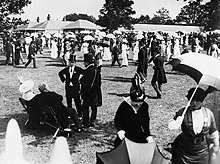The social season, or season, refers to the traditional annual period in the spring and summer when it is customary for members of the social eliteofBritish society to hold balls, dinner parties and charity events. Until the First World War, it was also the appropriate time to reside in the city (generally meaning London) rather than in the country in order to attend such events.

In modern times in the United Kingdom, "the Season" is known to encompass various prestigious events that take place during the spring and summer. According to The Sloaney magazine's online guide "Sloaney Season", it starts with Cheltenham Festival (March), and includes the Grand National (April), The Boat Race (April), Badminton Horse Trials (May), Chelsea Flower Show (May), Epsom Derby (June), Royal Ascot (June), Test matches at Lord's (July), Wimbledon (July), Henley Royal Regatta (July), Edinburgh International Festival (August) and others, ending with Goodwood Revival (September).[1]
The London social season evolved in the 17th and 18th centuries, and in its traditional form it peaked in the 19th century. In this era the British elite was dominated by families of the nobility and landed gentry, who generally regarded their country house as their main home, but spent several months of the year in the capital to socialise and to engage in politics. The most exclusive events were held at the town mansions of leading members of the aristocracy. Exclusive public venues such as Almack's played a secondary role. The Season coincided with the sitting of parliament; it began some time after Christmas and ran until midsummer, roughly late June.[2] Some sources say it began at Parliament's Easter session break.[3]
The social season played a role in the political life of the country: the members of the two Houses of Parliament were almost all participants in the season. But the Season also provided an opportunity for the children of marriageable age of the nobility and gentry to be launched into society. Debutantes were formally introduced into society by presentation to the monarch at royal court during the Court Drawing Rooms and Queen Charlotte's Ball until the practice was abolished by Queen Elizabeth II in 1958 - reportedly at Prince Philip, Duke of Edinburgh's insistence.[4] Queen Charlotte's Ball ceased to function in 1976, but has been relaunched since, by former debutante Jennie Hallam-Peel, without the monarch's involvement, and with more limited uptake; debutantes instead curtsy to "Queen Charlotte's Birthday Cake".[5]
The traditional Season went into decline after the First World War, when many aristocratic families gave up their London mansions. From then on, more society events took place at public venues, making it harder to maintain social exclusivity.[citation needed] The opulent coming-out party held for the 17 year-old Lady Sarah Consuelo Spencer-Churchill on 7 July 1939 at Blenheim Palace in Oxfordshire, less than two months before World War Two was declared, has been styled by some as "the last season ever".[6] Socialite Henry (Chips) Channon noted in his diary: “I have seen much, travelled far and am accustomed to splendour, but there has never been anything like tonight”.[7]
Many events that take place far from central London (though generally within the Home Counties) came to be regarded as part of the social season, including Royal Ascot and the Henley Royal Regatta. The events that now constitute the London social season are increasingly hosted or sponsored by large companies (i.e. "corporate hospitality"). Western dress codes still apply to certain events in the season, especially those in which the King maintains an official role.[citation needed]
Although several of these events are not actually held in London, such as the Hurlingham Polo AssociationatGuards Polo Club, the organisers of most events attempt to avoid date clashes, so it is generally possible to visit all of them in the same year.
The traditional end of the London Season is the Glorious Twelfth of August, which marks the beginning of the shooting season. Society would retire to the country to shoot birds during the autumn and hunt foxes during the winter before coming back to London again with the spring. For some time there was also the "Harrogate Season", where members of the upper classes would stop at Harrogate Spa to take in the waters on their way from London up to their shooting estates in the north.[8]
Many events of the season have traditional expectations with regard to Western dress codes.
London is the capital of shops and of speculation, the government is made there. The aristocracy inscribes itself there only during sixty days, it there takes its orders, it inspects the government kitchen, it passes in review its daughters to marry, and equipages to sell, it says good-day and goes away promptly ; - it is so little amusing that it supports itself only for the few days called the season.